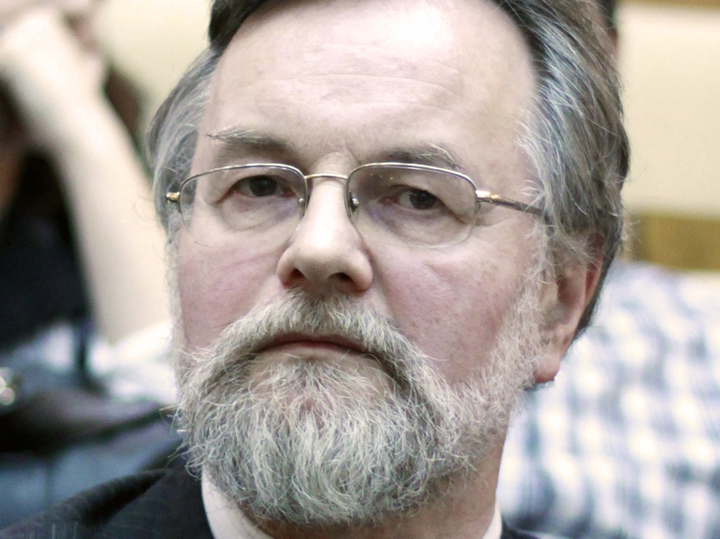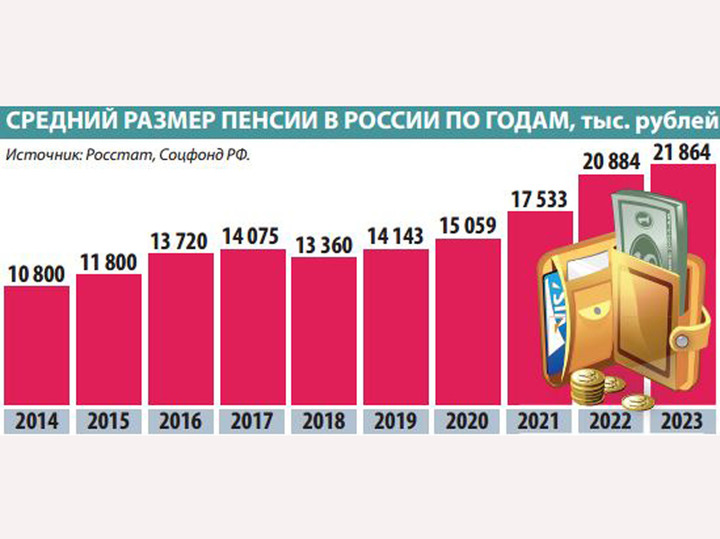Pensioners will have a pleasant surprise before the presidential elections: “They will try to appease the electorate”
Recent opinion polls show: Russians on average consider a pension of 70 thousand rubles worthy. Meanwhile, now it is about 22 thousand in the country, and from 2024 it will be about 24 thousand rubles. That is, for the vast majority of citizens it is 3 times less than desired. The question arises: is it possible to jump over this gap between reality and dream now or in the near future? How and with what financial instruments can you save for a dignified old age? Should we rely on the annual indexation of pensions carried out by the state? The answers to these questions were sought live from the MK press center by invited experts: associate professor of the basic department of the Chamber of Commerce and Industry of the Russian Federation “Human Resource Management” of the Russian Economic University. Plekhanova Lyudmila Ivanova-Shvets, professor of the Financial University under the Government of the Russian Federation Alexander Safonov, chairman of the Union of Pensioners of Russia Valery Ryazansky and member of the Council of the Confederation of Labor of Russia Pavel Kudyukin.
 < span itemprop="height" itemscope itemtype="https://schema.org/QuantitativeValue">
< span itemprop="height" itemscope itemtype="https://schema.org/QuantitativeValue">
< img src="https://static.mk.ru/upload/entities/2023/12/24/18/articlesImages/image/70/19/38/93/dac04875c45c25d23e939922c8f2b4e0.jpg" class="article__picture-image" alt ="" />
— I believe that in the foreseeable future such a pension amount (60–70 thousand rubles) is unattainable. What citizens want to receive in old age practically exceeds today's average salary of workers. This doesn't happen in reality. Of course, if you purposefully save, then anything is possible. But not now.

— The desired level of pension provision is impossible in reality. In Russia there is a direct relationship between salaries and pensions. In this regard, we need to talk about changing the income system and redistributing the gross domestic product. We need to reconsider how much and who should get from GDP. I believe that the current pension system is not fair and it leads to the fact that pensions in the country are now so low — in fact, at the subsistence level or slightly higher.

— Without some very serious changes in the general economic system, in socio-economic policy, it is impossible to receive such an amount in the form of a pension. We need to move away from the economy of cheap labor. Meanwhile, in Russia there is such a persistent harmful prejudice that low wages are a competitive advantage. But this is fundamentally wrong. Low wages are a brake on the development of the country. And without changing this policy, it will not be possible to achieve the desired level of pension, which provides a decent standard of living in old age. That is, the problem is unsolvable in the foreseeable future.

— In fact, for certain categories of pensioners, 60–70 thousand rubles is a completely achievable figure. To do this, you need to become a military man, for example, or serve in law enforcement agencies, where the level of pension primarily depends on official salaries. It is clear that the position must be quite high — not lower than major or lieutenant colonel. In this case, you can receive this kind of money in retirement. Or you need to become a deputy at the regional or federal level. For a certain category of civil servants, such a pension is also quite achievable. But again, for this you need to go through a very long career path. As for the mass contingent, we must proceed from the fact that our median salary, the most common, is in the range of 47–49 thousand rubles. Accordingly, with the tariff that is currently in effect, you can receive no more than 16 thousand from the insurance pension. Plus the fixed part — well, somewhere in the region of a little over 20 thousand it turns out. This is provided that the person has a sufficiently long working experience, at least 38 years. But recently we have seen a not very good trend in the labor market: the emergence of a large number of so-called self-employed people (almost 9 million). I'm not even talking about those people who work in the shadow employment sector. These people do not build up a pension period at all; accordingly, for them the problem will no longer be so much in receiving an average pension, but in receiving a pension in general as such. If we move at this pace and actively develop self-employment (and these are echoes of the cheap labor model, when employers save on everything, not only on wages, but also on insurance premiums), then people will soon only claim a social pension, which is at level of the subsistence level of a constituent entity of the Russian Federation. This is a very serious problem, which is a long-term challenge for our country, especially in the context of an aging population.
In fact, indexation is important and necessary taking into account inflation. But the thing is that the official inflation rate differs from the real numbers that every consumer faces. The fact is that even if the state indexed pensions at double or triple the rate, we would still most likely not catch up with the real price increase. In fact, indexation is simply maintaining the standard of living of pensioners just above the subsistence level.
— I agree that indexation is only the repayment of losses accumulated due to inflation. This is, as they say, maintaining the level that was. Indexation by 7.5% at the beginning of next year will probably not fully compensate for the losses. Let's remember what was broadcast live with the president. Topics related to energy resources, utility bills, medicines, and rising food prices were touched upon. All this suggests that pensioners are especially concerned about items that greatly affect their quality of life.
— Here we must take into account that inflation for different groups of goods is very different. My wife and I, being a classic family of two pensioners, keep track of our expenses. So, food costs for six months — from June to November — specifically in our country increased by 18%. Despite the fact that we are not at all luxurious. This is approximately 3 times higher than the official inflation rate.
— Indexation catches up with inflation, but does not compensate for it. From January 1, when indexation occurs, the next day prices continue to rise, and from that moment on, the pension again begins to lag behind the real movement of funds. In order to prevent this from happening, it is necessary to revise the indexing methodology, do it more often, for example, once a quarter, and, of course, look not at general inflation, as is now done, for 863 product groups, but return to the policy of assessing changes in price dynamics according to the consumer basket. These are real studies that should be carried out specifically on the consumption basket of certain socio-demographic groups.
“Without changing anything, without motivating employers and people with salary increases, it is difficult to expect that this system will take root. The average participant in economic life (be it teachers, doctors or, for example, people working in small and medium-sized businesses) simply does not have the resources to save certain amounts for old age year after year. Consequently, the problem cannot be solved “in the long run” without the participation of the employer. It is necessary that the employer invests funds in these savings accounts for his employees for two to three decades. Then, upon retirement, each of them will be able to save the treasured 3–4 million rubles in order to receive them in the form of a monthly payment of 60–70 thousand. Well, I don’t see any other ways at the current level of salaries.
— Well, what tools… Work as long as you have enough strength, trying, if possible, to find a place of work that pays a decent salary. A rather banal answer. Unfortunately, there is also the issue of extreme injustice towards working pensioners. This is a violation of the insurance nature of the labor pension — the fact that working pensioners do not have their pension indexed. The Ministry of Finance perceives pensions very one-sidedly — only as compensation for lost earnings. Let me remind you that our labor pension is of an insurance nature; people continue to pay contributions to the Pension (now Social) Fund. The fact that their pension is not indexed is unjustified from either an economic or social point of view. And so — yes, as long as there is strength and there are jobs in the economy, many have to work and thus still add to a low pension, often not a very high salary. This way it will somehow be possible to make ends meet.
— It seems to me that all the wishes regarding the participation of business in accumulating a pension are a plot from the realm of science fiction. Why? In order for you to have a pension of 20 thousand, the employer needs to pay about 22% to the social fund. And we must do this for almost 40 years. Exactly the same scheme should be present in the employee-employer relationship. The employer must pay at least 20% in addition to the mandatory payments to some pension fund in order for the amount to accumulate to be at least somewhat noticeable. Another savings option is investing in securities. But investing in securities is very risky if you are not a professional. Especially if you have a very small amount of money. 70–80% of people spend all their money only on current consumption. To think that they will somehow save up for a comfortable old age is to indulge in fantasy. But there are 20% of the population who receive truly decent wages. And they can already use other tools. The first is real estate. It almost constantly increases in value and can eventually be sold or rented out. But this is an option for a very small category of citizens who have serious money. Savings in bank deposits — yes, this is a real situation when you manage this money. But you need to understand that interest allows you to maintain the real purchasing power of this money, nothing more. Everything else is speculation.
— Yes, you have to survive somehow and also think about how you can increase your income through different approaches. Someone can work additionally, someone can earn extra money, someone can run a personal subsidiary plot. Well, I would also like to appeal to young people: remember that if you now receive a “black” or “gray” salary, then your pension will ultimately be small. And you will face exactly the same problem that your grandparents had.
— This is so — the recalculation of the person who quit will be made taking into account the accumulated indexations, and the pension will increase. And I advise everyone to negotiate with the employer: one and a half to two months after dismissal, you will receive an increased pension and you can add your salary to it if you are given the opportunity to return. Those who have worked for about 10 years in retirement will receive an increase in their pension somewhere in the region of 5-7 thousand rubles per month. This is a fairly significant amount for pensioners given the payments that we actually have now.
This is common practice. We have repeatedly seen such “handouts” at public expense in past election campaigns — both parliamentary and presidential. Yes, this is not an excluded option. But, in my opinion, these will most likely be payments not to pensioners, but to families with children, judging by the already established socio-political trends. But I don’t want to deprive older people of hope: maybe some one-time payments for pensioners will also appear. But, you know, here I don’t have insider information from the candidates’ headquarters, especially since the candidates have not all been identified yet, and we don’t yet know which of them will be registered by the election commission. So there may be all sorts of surprises here, including pleasant ones.
— First of all, rely only on yourself, look for profitable employment, which would allow you not only to form a pension through contributions to the Social Fund, but also to independently save for your future old age. In this way, you can protect yourself from any changes in the pension system: will it be insurance, will it be in the form of social security, or just a social pension (there are many discussions on this matter, and there are also many decisions in different countries). To achieve this, you need high-quality vocational training, then a good job and, accordingly, finding an employer who pays good money. Well, then save, save, save from your salary.
— You need to start saving from a young age and use all the tools for this. I believe that even with a small salary you need to think about the future. Young people think: “well, I won’t live to see 65” or “retirement is far away, I want to live now.” But retirement age comes very quickly — you won’t have time to look back. Therefore, you need to think about your future pension today.
— Those who are still working and only somewhere in the future can become a pensioner need to increase their demand in the labor market, invest in education, in mastering new knowledge and skills. But, no less important, we need to fight to move away from that notorious economy of cheap labor.



